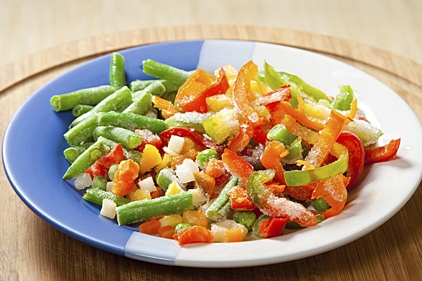Study Encourages Consumers to Think Frozen

As Americans strive to eat healthier and add more fruits and vegetables to their diets, a study concluded "market basket" study has a simple message for consumers—think "frozen."
The Frozen Food Foundation, a not-for-profit organization affiliated with the American Frozen Food Institute (AFFI ), McLean, Va., dedicated to fostering scientific research, public awareness and education regarding the nutritional value of frozen foods, partnered with the University of Georgia to conduct a study comparing the nutrient content of eight commonly-purchased frozen and fresh fruits and vegetables.
The study mimicked consumer purchasing and storage habits of blueberries, strawberries, corn, broccoli, cauliflower, green beans, green peas and spinach. To account for variables such as growing conditions, country of origin and time in the supply chain, composite samples were prepared from fresh and frozen fruits and vegetables purchased from six independent grocery stores.
Each fruit and vegetable was analyzed under three conditions—frozen; fresh (on the day of purchase); and fresh-stored (after five days of storage in a kitchen refrigerator). Surveys show that Americans may, on average, store perishable fruits and vegetables for up to five days or more, based on bi-weekly grocery shopping habits.
The study results also revealed that the nutritional value of many frozen fruits and vegetables are generally equal to that of their fresh counterparts. The nutritional value—namely the amounts of vitamins A and C and folates—of some frozen fruits and vegetables is greater than that of fresh-stored produce. This determination likely owes itself to the nutrient degradation that occurs in fresh produce during storage. Frozen fruits and vegetables are picked and frozen at their peak ripeness, locking in the nutrient value at the point of freezing.
"Our research shows that frozen fruits and vegetables are nutritionally equal to—and in some cases better than—their fresh counterparts," says Dr. Ronald Pegg, associate professor at University of Georgia and leader of the study. "In particular, vitamin A was greater in frozen fruits and vegetables than select fresh-stored fruits and vegetables."
Consumers cite affordability, quick and easy preparation, ease of storage and reduced waste as key reasons they purchase frozen fruits and vegetables, according to research conducted by the Produce for Better Health Foundation, Hockessin, Del. While most consumers agree they should be eating more fruits and vegetables, by a nearly 2:1 margin, they mistakenly consider fresh fruits and vegetables a healthier option than frozen produce.
"Frozen fruits and vegetables can play an important role in helping Americans easily add more fruits and vegetables to their diets to meet daily recommendations," says Dr. Elizabeth Pivonka, president and CEO of the Produce for Better Health Foundation. "Fresh and frozen produce have minor nutritional variances and provide a wide range of valuable nutrients essential for good health."
This research provides valuable new insights into the nutritional value of frozen and fresh fruits and vegetables, adding significantly to the growing body of research highlighting the nutritional benefits of frozen produce.
"Freezing is simply nature's pause button," says Kraig Naasz, president and CEO of AFFI. "As this research clearly shows, freezing is a natural and effective way to preserve the nutritional value and quality of fresh food."
For more information on this campaign, check out Refrigerated & Frozen Foods’ December 2013 issue.
Looking for a reprint of this article?
From high-res PDFs to custom plaques, order your copy today!






